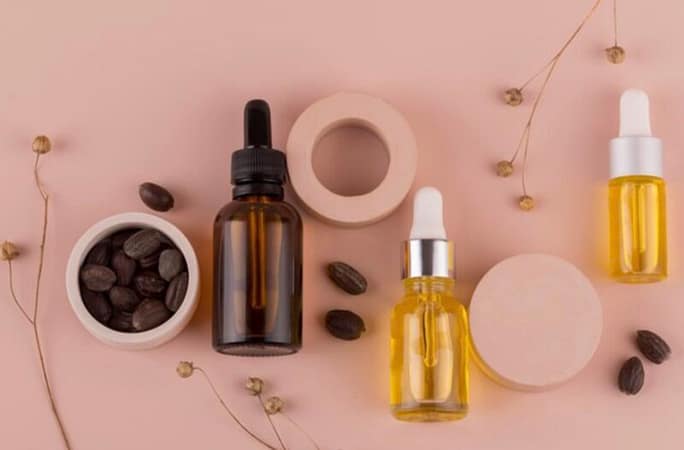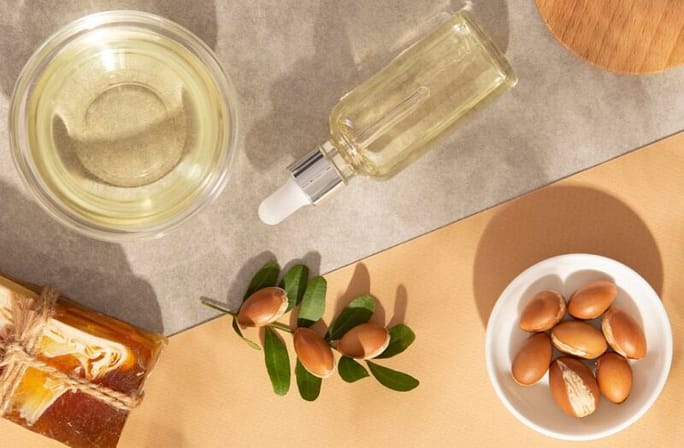Myths and Facts of Plant-Based Oils in Skincare are crucial knowledge. Understanding dispelled misconceptions ensures optimal use, preventing potential skincare pitfalls. This knowledge empowers you to harness the benefits of plant-based oils for a radiant and healthy complexion.
I. Introduction
In the ever-expanding domain of skincare, plant-based oils stand out as transformative elixirs, captivating beauty enthusiasts worldwide. Today, we unravel the intriguing landscape surrounding the Myths and Facts of Plant-Based Oils in Skincare.
Join me on a journey to demystify common misconceptions, guiding you toward harnessing the full potential of these natural wonders for radiant and vital skin.
II. Myth 1: Plant-Based Oils Cause Breakouts
Dispelling the misconception that using oils leads to acne is crucial. Non-comedogenic oils can benefit acne-prone skin by regulating sebum production, providing essential nutrients, and promoting a balanced complexion.
It possesses anti-inflammatory properties and aids in the overall improvement of skin health without exacerbating acne concerns.
A. Several non-comedogenic oils are suitable for all skin types. Examples include;
- Jojoba oil
- Argan oil
- Squalane oil
- Hemp seed oil
- Grapeseed oil
- Sunflower oil
- Almond oil
- Rosehip oil
These oils are less likely to clog pores, making them excellent choices for various skin types, including oily and acne-prone.
III. Myth 2: All Oils Are the Same
A. Plant-based oils exhibit diverse properties, each offering unique benefits for the skin. For instance:
1. Jojoba Oil
Balances sebum production, suitable for all skin types.
2. Argan Oil
Nourishes and moisturizes, combating dryness.
3. Rosehip Oil
Addresses signs of aging, such as fine lines and wrinkles.
4. Chamomile Oil
Soothes sensitive skin, reducing inflammation.
5. Tea Tree Oil
Has antimicrobial properties, beneficial for acne-prone skin.
Understanding the distinctive qualities of these oils allows for tailored skincare, addressing specific concerns and promoting a well-rounded approach to skin health.

IV. Myth 3: Oils Make Your Skin Greasy
Dispelling the belief that using oils results in an oily complexion is essential. The key lies in selecting the right oil and adopting proper application techniques for a non-greasy finish.
Opt for lightweight oils like jojoba or squalane, which mimic the skin's natural oils. Apply sparingly, allowing the skin to absorb the product, and consider incorporating oils into your nighttime routine for optimal hydration without a greasy residue.
A. List of lightweight oils that are used in skincare
1. Jojoba Oil
Mimics the skin's natural oils, suitable for all skin types.
2. Squalane Oil
Lightweight and non-greasy, excellent for hydration.
3. Grapeseed Oil
Absorbs quickly, for oily and combination skin.
4. Argan Oil
Moisturizes without feeling heavy, rich in antioxidants.
5. Almond Oil
Light and gentle, for sensitive skin.
6. Apricot Kernel Oil
Easily absorbed, great for dry or sensitive skin.
7. Sunflower Oil
Non-comedogenic and light, ideal for acne-prone skin.
8. Hemp Seed Oil
Balances oil production, suitable for various skin types.
9. Camellia Oil
Quickly absorbed, leaves the skin soft and smooth.
10. Safflower Oil
Lightweight and hydrating, for most skin types.
These oils are lightweight options that won't feel heavy on the skin.
V. Fact 1: Plant-Based Oils Are Packed with Nutrients
Plant-based oils boast nourishing qualities, delivering a wealth of essential vitamins, antioxidants, and fatty acids to the skin. These potent elements work synergistically to rejuvenate and enhance skin health.
Vitamins like A, C, and E promote collagen production and protect against environmental damage, while antioxidants combat free radicals. Fatty acids, such as omega-3 and omega-6, contribute to skin barrier integrity, ensuring hydration and a radiant complexion.
Incorporating plant-based oils into your skincare routine is a holistic approach to nourishing and revitalizing your skin.
VI. Fact 2: Oils Can Balance and Regulate Sebum Production
Contrary to the myth that oils exacerbate oily skin, certain plant-based oils can effectively regulate sebum production, benefiting both dry and oily skin types. Oils like jojoba and grapeseed possess sebum-balancing properties, signaling the skin to produce less oil when it senses sufficient hydration.
By incorporating these oils, you provide essential moisture to dry skin and assist in controlling excess oil on oily skin, promoting a balanced and harmonious complexion for all skin types.
VII. Fact 3: Plant-Based Oils Are Suitable for All Skin Types
Rest assured, there's a plant-based oil suitable for every skin type.
A. Choosing the right oil depends on individual skin needs
1. Dry Skin
Opt for nourishing oils like argan or avocado for intense hydration.
2. Oily Skin
Lightweight, non-comedogenic oils such as jojoba or grapeseed help regulate sebum.
3. Sensitive Skin
Soothing options like chamomile or calendula can provide relief.
4. Combination Skin
Use a balanced oil like rosehip to address varying needs.
Understanding your skin's unique requirements ensures a tailored approach, harnessing the benefits of plant-based oils for a radiant and harmonious complexion.

VIII. Debunking Common Misconceptions
Addressing additional misconceptions ensures a comprehensive understanding of plant-based oils.
A. Common Concerns
1. Clogging Pores
Most plant-based oils are non-comedogenic, reducing the risk of pore-clogging.
2. Applicability to Acne-Prone Skin
Certain oils, like tea tree and rosehip, offer benefits without exacerbating acne.
3. Effectiveness on Mature Skin
Oils rich in antioxidants, such as argan and pomegranate, prove effective for mature skin.
By dispelling these concerns, readers can make informed choices, embracing the true potential of plant-based oils in their skincare routines.
IX. Tips for Incorporating Plant-Based Oils Into Your Skincare Routine
A. Practical Tips for Integrating Plant-Based Oils
1. Start with a Patch Test
Test a small amount on your wrist or jawline to ensure no adverse reactions.
2. Choose the Right Oil for Your Skin Type
Tailor your choice based on whether your skin is dry, oily, or combination.
3. Incorporate into Your Cleansing Routine
Use oils like jojoba or olive oil for oil cleansing to remove makeup and impurities.
4. Mix with Your Moisturizer
Add a few drops of your preferred oil to your daily moisturizer for added hydration.
5. Target Specific Concerns
For anti-aging, apply oils rich in antioxidants like argan or rosehip directly to targeted areas.
6. Use as a Night Treatment
Apply a slightly heavier oil before bedtime for deep overnight hydration.
B. Recommended Usage Frequency
1. Daily Use
Suitable for oils like jojoba or squalane, especially for normal to dry skin.
2. 2-3 Times a Week
For oils with additional benefits, such as rosehip or argan.
3. Spot Treatment
Apply specific oils as needed for targeted concerns.
Remember, a little goes a long way. Start with a small amount and adjust based on your skin's response. Consistent and mindful use ensures you reap the maximum benefits of plant-based oils in your skincare routine. You should check out my blog post about plant-based elixir and learn to make your own elixir.
X. Frequently Asked Questions about Plant-Based Oils in Skincare
Are plant-based oils suitable for all skin types?
Yes, there are plant-based oils suitable for various skin types. Jojoba, squalane, and grapeseed oil are versatile options.
Will using oils make my skin greasy?
Not necessarily. Choosing the right oil and proper application can prevent a greasy feel. Lightweight oils like jojoba are excellent for this.
Can plant-based oils help with acne-prone skin?
Yes, certain oils like tea tree and rosehip have properties that benefit acne-prone skin without causing breakouts.
How do I choose the right oil for my skin type?
Consider your skin type and specific concerns. For example, argan oil is moisturizing, while jojoba regulates sebum production.
Are plant-based oils effective for mature skin?
Absolutely. Oils rich in antioxidants, such as argan or pomegranate, can be beneficial for mature skin.
How can I integrate plant-based oils into my skincare routine?
You can mix a few drops with your moisturizer, use them in oil cleansing, or apply them as a night treatment for deep hydration.
Are there lightweight plant-based oils?
Yes, many oils like jojoba, squalane, and almond oil are lightweight and suitable for daily use.
Do plant-based oils clog pores?
Most plant-based oils are non-comedogenic, meaning they are less likely to clog pores. Jojoba and grapeseed oil are good examples.
Can I use plant-based oils during the day?
Yes, especially lightweight oils like squalane or jojoba. Adjust the quantity based on your skin's needs to avoid a greasy feel.
How often should I use plant-based oils in my skincare routine?
Frequency depends on your skin type and concerns. Daily use is suitable for some, while others may prefer 2-3 times a week. Adjust based on your skin's response.

XI. Additional References
- Essential Components from Plant Source Oils: A Review on Extraction, Detection, Identification, and Quantification (2023) https://www.ncbi.nlm.nih.gov/pmc/articles/PMC10574037/
- Plant Extracts as Skin Care and Therapeutic Agents (2023) https://www.ncbi.nlm.nih.gov/pmc/articles/PMC10607442/
- Plant-Derived Antioxidants: Significance in Skin Health and the Ageing Process (2022) https://www.ncbi.nlm.nih.gov/pmc/articles/PMC8776015/
- Anti-Inflammatory and Skin Barrier Repair Effects of Topical Application of Some Plant Oils (2018) https://www.ncbi.nlm.nih.gov/pmc/articles/PMC5796020/
XII. Conclusion in Unveiling the Myths and Facts of Plant-Based Oils in Skincare
Navigating the intricate world of skincare involves debunking myths and embracing the facts surrounding plant-based oils. We've uncovered the truth about their diverse benefits, dispelling misconceptions along the way.
From addressing concerns about acne to highlighting their nourishing qualities, the Myths and Facts of Plant-Based Oils in Skincare have been unraveled. As you embark on your skincare journey, remember that there's a plant-based oil suited for every skin type and concern.
Tailoring your routine to your unique needs ensures a radiant and harmonious complexion. Embrace the transformative power of these natural elixirs, incorporating them wisely into your daily rituals.
Let the dispelled myths guide you toward a skincare routine that celebrates the inherent beauty of plant-based oils and the vitality they bring to your skin.
XIII. My Experience
As someone deeply invested in natural skincare, diving into the Myths and Facts of Plant-Based Oils in Skincare has been an enlightening journey for me. My keen interest lies in understanding each plant-based oil intricately, discerning the unique benefits they offer.
Armed with this knowledge, I aim to choose the best oils tailored to my skin's needs. Learning how to seamlessly integrate these oils into my skincare routine has been a priority.
The quest is not just about dispelling myths but about maximizing the benefits these natural elixirs bring. I'm enthusiastic about discovering the perfect balance, ensuring each drop contributes to the nourishment and radiance of my skin.
This journey is not just about skincare; it's a holistic approach to embracing the transformative power of plant-based oils for a healthier, more vibrant complexion. You should read my blog posts about the benefits of plant-based oil in skincare, Hydrating food for skin, and natural skincare.
I have a favorite plant-based oil that is gaining popularity now in skincare and that is the avocado oil! It is my favorite in my salad but I think soon it will be my favorite ingredient in skincare products. Read all about it in my blog post.
Embark on your personalized skincare journey by exploring more enlightening content on plant-based beauty in my other blog posts.
Your discoveries and experiences are invaluable, and I invite you to connect with me. Share your insights, questions, and the joys of your skincare exploration.
Let's build a community committed to celebrating the benefits of plant-based oils and nurturing radiant, healthy skin together. Connect with me and share your skincare stories – your journey is an inspiration!

 Simple. Natural. Better.
Simple. Natural. Better.